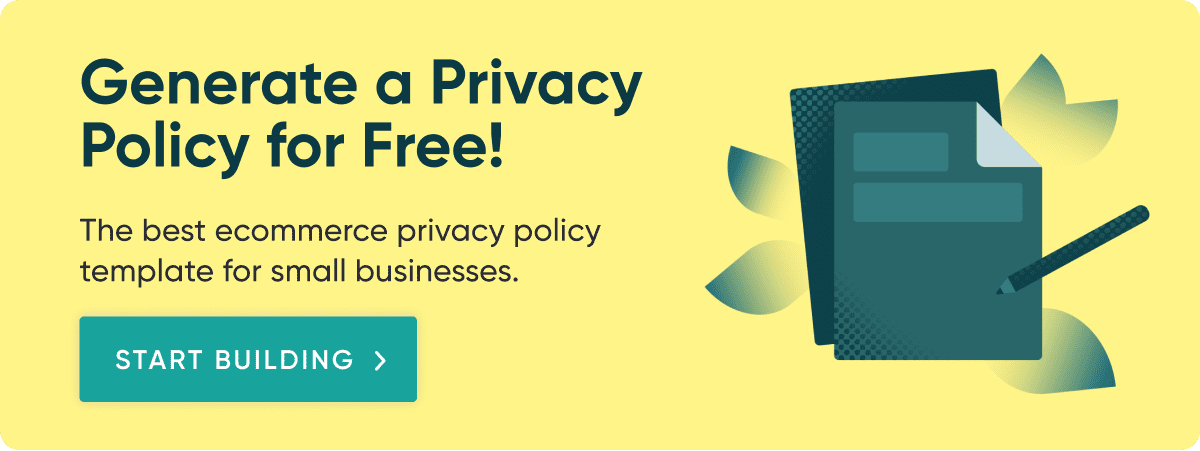Do I Need A Privacy Policy For A Personal Blog?
The fear of a possible legal liability that your blog could face might make you think of ways to safeguard it. Not having a privacy policy could be a potential cause of legal action against your blog. In this article, we will discuss what a privacy policy is, whether you need one for your personal blog, and what a good privacy policy should contain.
You can also check out our free privacy policy generator to get started with creating one for your website.
What Is A Privacy Policy?
A privacy policy discloses and explains how you collect and process user data. It also explains how you ensure that the data you collect remains confidential. Most privacy policies are formulated on a basic set of requirements that comply with commonplace global privacy laws.
However, your privacy policy may differ slightly from that of another blog. This is because of the geographical location of your blog and that of your audience, which could mean that you’ll have to tailor your policy according to region-specific laws.
A privacy policy ensures transparency when it comes to handling gathered user information.
Some examples of information that your blog might collect include:
- Names: If users have to sign-up to view your content, register for promotions or updates, or become a member, they’ll have to give you their name.
- Email addresses: Email addresses allow users to receive content or alerts that you send out.
- Contact information: You might collect phone numbers for updating your readers or delivering a purchase to their address.
- IP address: When a user visits your blog, their IP address will automatically be stored in your blog’s database.
- Comments: Comments reflect a user’s views, goals, and pain points. They could be used by companies for targeted advertisement. If you sell user data to advertisement companies, you must mention this in your privacy policy.
- User actions: These include details about how readers spend their time on your blog. Examples include the amount of time spent on the blog, number of clicks, ads viewed, and links opened.
- Credit card details: You might store credit card information if users purchase something from your blog.
Do I Need A Privacy Policy For A Personal Blog?
Yes, you need a privacy policy for your personal blog if you collect user information. In fact, you must ensure that your readers don’t have to dig through your blog to find your policy. It should be clearly visible in the form of a privacy policy URL link or menu button.
Almost all privacy policies comply with standard global privacy laws and are more or less the same. In addition to global privacy laws, your privacy policy must also comply with the CMS (Content Management System) you use, such as Wordpress.
If your blog is made using Blogger (or Blogspot), it may be helpful to know that you must comply with following laws:
- CalOPPA (California Online Privacy Protection Act)
- GDPR. The General Data Protection Regulation (GDPR) law applies to your blog when you have an audience from the European Union.
You must also disclose any third-party service that you add to your blog in your privacy policy.
If you’re confused about where to begin, check out our blog post on How Do I Create A Privacy Policy For My Business.
What Should A Privacy Policy Contain?
Although privacy policies can differ slightly based on your location, a few basic requirements that you should address include:
- Collecting and using user information. You should clarify the type of user information stored by your blog. You must also mention how the stored information will be used in the future.
- Sharing user information. If you choose to share user information (e.g. names, email addresses, and phone numbers) with a third-party. This must be disclosed to the user.
- Using cookies. If you use cookies to track how users navigate your blog, you should mention this in your privacy policy.
- Maintaining confidentiality. Your privacy policy should explain how user information will be protected against external threats.
And That’s A Wrap…
To sum it up, a privacy policy describes how you collect, use, and protect user data. International laws require personal blogs that collect user information to have a privacy policy and you could face legal action if you don’t have one.
All privacy policies are similar. They mention the type of user data you collect, how you use it, and whether you share it with a third party. In some cases, you might need to tailor your privacy policy according to region-specific laws. Finally, don’t forget to take into account the laws of your CMS when drafting a privacy policy for your blog.


